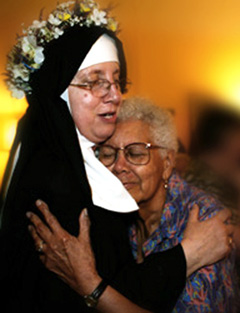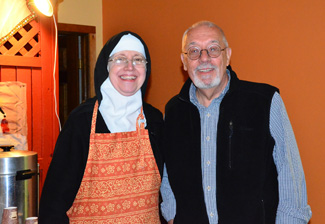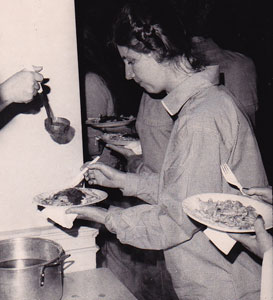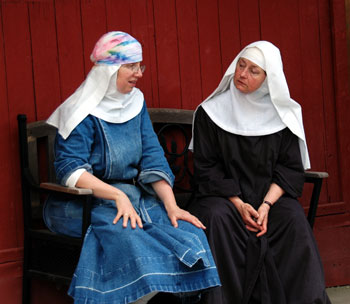
 |
|
“Finally brothers, let your minds be filled with everything that is true, everything that is honorable, everything that is upright and pure, everything that we love and admire with whatever is good and praiseworthy. Keep doing everything you learnt from me and were told by me and have heard or seen me doing. Then the God of peace will be with you.”
Philippians 4:8
“Our lives begin to end the day we become silent about things that matter.”
Dr. Martin Luther King Jr.
|

A test of our sincerity in the practice of non-violence is this: are we willing to learn something from our adversaries? If a new truth is made known to us by them or through them, will we accept it?
From the article Blessed are the Meek by Thomas Merton
I see qualities Mother Olivia Frances used in the classroom that made her a great Montessori teacher, now make her a great prioress. She is calm, very thoughtful, has a great deal of patience and can think outside the box.
Mary McElroy, former Principle of a Montessori School  In 1991 Beverly was Clothed in the monastic habit and received the name "Sister Olivia Frances" a name reaching back to her formative experience in the St. Francis de Sales School in St. Louis for which she has always been grateful. Her religious name also honors her maternal grandfather and her mother, both named "Olive" and evokes an ancient invocation to St. Benedict that highlights his fruitfulness as founder of Western Monasticism, In 1991 Beverly was Clothed in the monastic habit and received the name "Sister Olivia Frances" a name reaching back to her formative experience in the St. Francis de Sales School in St. Louis for which she has always been grateful. Her religious name also honors her maternal grandfather and her mother, both named "Olive" and evokes an ancient invocation to St. Benedict that highlights his fruitfulness as founder of Western Monasticism, O Olive ... Sister Olivia Frances made Final Profession of Vows in 2000, becoming "Mother Olivia Frances", and received the Blessing of Consecration in 2007.
ORGANIZER-ACTIVIST-EDUCATOR Very early in her monastic life it was clear that Mother Olivia Frances brought her professional training as organizer, activist and educator to her obediences (monastic works). Mother Olivia Frances is passionate about recycling. She has worked in the Abbey Compost Department for many years and continues to do so. Under her guidance a new compost facility which we call Lazarus was built in 2007. In her work in both the Abbey Library and for the Cellarer she organizes the recycling of books and piles of "treasures" from our attics and basements, a work that has been particularly critical to the our New Horizons renovation project.  One of her greatest strengths is in coordinating and scheduling the work of volunteers as during the tag sales following our major clean-up of spaces needing to be renovated. Through her outreach in recycling, networking with libraries and charitable organizations, she has made new friends for the Abbey. She is not afraid to ask for help, trusting that volunteers will discover through their mutual work that she is committed to them personally, and holds their concerns and burdens in her prayer and heart. One of her greatest strengths is in coordinating and scheduling the work of volunteers as during the tag sales following our major clean-up of spaces needing to be renovated. Through her outreach in recycling, networking with libraries and charitable organizations, she has made new friends for the Abbey. She is not afraid to ask for help, trusting that volunteers will discover through their mutual work that she is committed to them personally, and holds their concerns and burdens in her prayer and heart. 
...every table should have two cooked dishes, on account of individual infirmities, so that he who perchance cannot eat of the one, may make his meal of the other.
Providing for dietary exceptions is much more complex today than in 500 A.D., St. Benedict's time, and Mother Olivia Frances fulfills this injunction amidst all of the stress of the kitchen with graciousness and equanimity.
If I had to say why Mother Prioress makes a great prioress, I would say—first, she is totally dedicated to the life of the community. I worked with her for many years in the kitchen and elsewhere in the house so I know firsthand that she is an able organizer, who knows how to activate and involve the whole community. She can stay calm in the midst of a lot of tension. She is a tireless worker. I find her perspective on life very creative and usually complementary to mine so I learn a lot from her and she can fill out the whole picture for me. She is one of the most honest people I have ever met. She is also very funny and can make me laugh.
Mother Abbess Lucia speaking about our new Prioress  Abbess Emerita David has depended on Mother Olivia Frances for years for her stability, especially in the kitchen and her steadfastness as a Formation Mother who guides members of the community in First Vows. She describes her as Abbess Emerita David has depended on Mother Olivia Frances for years for her stability, especially in the kitchen and her steadfastness as a Formation Mother who guides members of the community in First Vows. She describes her as ...unflinching in her capacity to confront different situations with equal fairness and a strong sense of justice.
Her "doggedness" and capacity to listen enable her to stay with a person or situation under her care to the bitter end. She can be challenging as a "straight-shooter" or playful as she was with the pre-school children she taught:"Did you have baloney for breakfast?" With her fertile mind, she makes many proposals, but is willing to have them redirected by authority. Mother Prioress Olivia Frances first came to the Abbey as an activist and it a amazing that in her contemplative vocation she has become more so, as her activism springs from her prayer, reading and reflection. Now we will continue to count on her as Prioress to protest when she sees an injustice and advocate for the truth of another.
|
| Copyright © 2013 Abbey of Regina Laudis. All rights reserved. | |